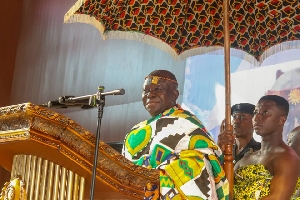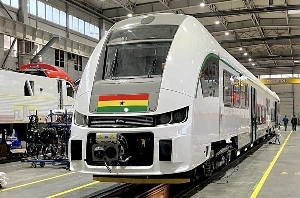Opinions of Friday, 24 April 2015
Columnist: Sarpong, Justice
Nkrumah's ideologies in Francophone Africa
Analyzed by Bamba Mass
During Kwame Nkrumah's day the francophone foil to Nkrumah's Ghana was supposed to be the Ivory Coast of Felex Houphoet Boigny. Both countries entered into independence with apparently strong economies; both were led by strong and charismatic political leaders.
The big difference between the two countries was supposed to be ideological. Nkrumah had been moving further and further to the left, and had become increasingly alienated from the former imperial power, Great Britain. The Ivory Coast at the time appeared to be a model experiment in the free market economy and a hospitable environment for foreign investment and for friendship with the West particularly France. Nkrumah and Houphoet Boigny – are even supposed to have taken a wager between them – a bet as to which country would be ahead in a decade or two. The Ivory Coast won the bet at that end of stage. But Boigny's styles of one party leadership was similar just that the difference with him was to allow economic growth.
For other West African Francophone country with which Ghana could be compared was Senegal. Both countries were cultural vanguards in an African context. Both had charismatic leaders – Nkrumah in Accra and Leopold Sedat Senghor in Dakar. Countries had a vision of Pan-Africanism – Nkrumah was committed to the dream of political Pan-Africanism, Senghor was committed to the vision of cultural negritude. As Aime Ceesay put it: "My Negritude, my Blackness is no tower and no cathedral"
Negritude was part of what Senghor considers the best way to control Africa into a united continent. Having come from a predominantly large Muslim country like Senegal with powerful religious leaders, and him being Christian, Senghor found out that trading with smartness was his only way of staying longer than a day as leader. He did it with mastery and stayed years and years even defeating Muslim opponents at elections. Having laid down a very strong foundation stone for Africa's strongest multi party Democracy, He voluntarily retired from politics and stepped down from power and handed to his deputy Abdou Joof.
In Guinea Conakry Nkrumah's friend Saihou Touray was a brutal dictator who ruled with impunity until death and the country fell into the hand of an army general Lansana Conte too rule with brutal force until death and the list goes on for Guinea until Capt. Musa Dadis Camara ruler after Gen Conte was shot by his own body guard and his assistant Saikouba Conate took over who led the country to first true multi party elections that brought a long time opponent professor Alpha Conde to power.
The Anglophone Africa suffered more with the Nkrumah Ideology:
Other African leaders followed in Nkrumah's footsteps. Julius Nyerere became the first president of Tanganyika (Tanzania) in 1962 and announced his brand of African socialism built around rural folks and their traditional values in an ujamma (extended family) system. Millions of villagers were forced into collectivized agriculture. He modeled his constitution after Ghana's and followed Nkrumah's script. Nyerere established a one-man, one-party state around his Tanganyika African National Union, outlawed strikes, nationalized private banks and industries, duplicated Nkrumah's preventive detention act to go after his opponents and greatly increased his personal power.
With the exception of a few countries, Africa had been incurably infected by Nkrumah's one-man, one-party virus before the end of the 1960s. Most of the leaders of the newly independent African countries followed Nkrumah's political formula by declaring states of emergency, suspending their constitutions, conferring unlimited executive powers upon themselves, and enacting oppressive laws which enabled them to arrest, detain and persecute their rivals, dissenters, and others they considered threats at will.
The economic and political outcomes of the one-man, one-party dictatorships by the end of the 1960s were dismal. Nkrumah's program of rapid industrialization by reducing Ghana's dependence on foreign capital and imports had a devastating effect on its important cocoa export sector. Many of the socialist economic development projects he launched failed. Similarly, Tanzania nose-dived from the largest exporter of agricultural products in Africa to the largest importer of agricultural products. The one-man, one-party state also proved to be ineffective in reducing ethnic tensions and preventing conflict. Civil wars, genocides, low level ethnic conflicts and corruption spread throughout the continent like wildfire.
In Zimbabwe, Multipartyism was supposed to be alien to African tradition. President Robert Mugabe said when he was interviewed by journalist. Maybe Comrade Sally Mugabe, the late and dearly missed Ghanaian wife of the President Mugabe, made a contribution to her husband's cultural interpretation of the case of the one-party state. At any rate Robert Mugabe eloquently made the cultural case against the idea of a multi-party Zimbabwe. African indigenous traditions did not institutionalize regular opposition to its own rulers. The concept of a loyal opposition was, through African eyes, a contradiction in terms. Mugabe has since made such an African opposition increasingly difficult to remain loyal.
Kenneth Kaunda, of Zambia even earlier bought Nkrumah's culturalcase for the one-party state. But Kaunda's pragmaticcase was very different from Nkrumah's. While Nkrumah had argued that independent Ghana was too dangerously divided to risk a multiparty system, Kaunda argued that Zambia was too happily united to afford the "absurdity" of an artificial multiparty system. He even argued that at independence the ruling party in Zambians virtually anonymous, came on board in unity. Why create an artificial opposition? But Kaunda was wise and only buying time his pragmatic argument was therefore fundamentally different from that of Kwame Nkrumah's fear of Ghana's disintegration. He eventually allowed multi- party democracy and rules for some time until he was finally defeated in an election and he willing gave back power when he bowed to the wishes of the electorates and lives with his dignity intact.
In Kenya, after the founding father, Jomo Kenyatta, Kenya's Daniel Arab Moi was for so long only partially convinced by the Nkrumah ideology. He was described by some pundits that he was a giraffe that see danger from a long distance and he uses that more often than the Nkrumah theory. That is why Kenya's one-party state was only de-facto (in fact) rather than de-jure (in law) from 1964 to 1982. Kenya was definitely not converted to Nkrumah's Leninist argument of the vanguard party. But the cultural argument that Africans preferred consensus to competition was for a while sponsored by the ruling party.
The pragmatic argument in favour of the one-party state in Kenya arrived after the 1982-attempted coup against President Daniel Arab Moi. A constitutional amendment turned Kenya into a de jure one-party state for the first time since independence. Was Kenya at long last catching up with Kwame Nkrumah's single-party legacy in its fuller ramifications? Fortunately the people of Kenya were already restless for a more representative political order. Multiparty politics returned to Kenya after 1992.
Sir Milton Magai and his brother Albert ruled with the same system for decades but through multi party democracy. Not until Sierra Leone's Edward Siaka Steven come in. This man brought in a one party state into Sierra Leone and ruled with an Iron fist for decades before he finally handed over to his own handpicked Joseph Momoh who continued his legacies until the military coup led by Capt. Valantine Strasser.
Siaka Stevens destroyed all the infrastructure Sierra Leone was built in and brought in corruption at its very core with a complete different kind of Nkrumah style democracy. Political opponents were killed while many disappeared without trace. The state resources were being wasted on foreign investments for Siaka's personal gains while the country plunged into severe poverty. As a result, Siaka Stevens in real terms is responsible for the civil war in Sierra Leone for at the time of the civil war, people were so much in pain.
Though in the Gambia there was tiny bit of multi party democracy when the then PPP regime that led the country to independence from Britain was in power as people were free to criticize, But the leader of the country Sir Dawda Jawara dominated politics for thirty years refusing to leave until a military coup which brought Yahya Jammeh to power flushed him out.
These failed policies and ideologies created the worst for Africa and as a result, waiting in the wings were Africa's soldiers who these dictators use as a tool for suppression. They eventually help the public to hate the tyrant so as to create a space for them to step in as saviors. When they come, they accuse the civilian governments of corruption, incompetence and mismanagement of the economy and claiming a patriotic duty to rescue their countries from collapse.
That was how military officers succeeded in knocking off these governments one by one.
Even Nigeria did not escape. In 1966, Nigerian Military stepped in to upsurge terror and corruption into Nigerian lives. The coup was commissioned by Major-General J. T. U. Aguiyi-Ironsi. The report was compiled by Lt-Col Yakubu Gowon, Captain Baba Usman of Military Intelligence, and Alhaji Yusuf. After Nigeria gained independence from the UK, its domestic politics TRIED to emulate that of its former colonial master by adopting a Westminster-style, parliamentary democracy. There the similarities ended. Instead of the cultured debate and sophisticated party political culture of the UK, Nigeria's politics fragmented on regional and ethnic lines. NPC's deputy head Tafewa Balewa became the Prime Minister and NCNC's leader Dr Nnamdi Azikiwe took the ceremonial role of President. The AG led the opposition.
The makeup of the Government was odd. The NPC's leader, Sir Ahmadu Bello, could have become Prime Minister but, instead, he chose to become leader of the Northern Region and handed over the Prime Minister's chair to his deputy, Tafewa Balewa. Rightly or wrongly, many southern politicians viewed Balewa as Bello's puppet and resented the fact that (in their opinion) the government was being ruled by proxy by a regional ruler and viewed Bello as the real power beyond the throne. This may have led southern politicians to have a disrespectful attitude toward Balewa. This perception was not helped when Bello referred to Balewa as "my lieutenant in Lagos."
The led the military mainly of Ibo origin to stage a coup killing Balewa and Amadou Bello both of whom are of the Northern Hausa origin prompting counter coups bringing in the Northerners who never left thus destroying the very fabrics of the Nigerian dream
Gen. Joseph Mobutu seized power in the Democratic Republic of Congo (and named it Zaire) following a protracted political struggle between Patrice Lumumba and Joseph Kasavubu. He became a compete devil in human form
Col. Houari Boumedienne overthrew Ahmed Ben Bella in Algeria and he too became another devil until subsequent coups followed thus destroying the country's infrastructure and raised the state economy to the ground.
A group of army officers overthrew the monarchy in Brundi. In the Central African Republic, Col. Bokassa (later Emperor Jean Bedel Bokassa) overthrew David Dacko and became Africa craziest devil butchering his people with impunity and when madness overcome him, he declared himself God sent emperor until his overthrow.
Gen. Idi Amin overthrew Milton Obote in Uganda plunging more flows of African blood and wails of fatherless children with tears. Amin brought every ideology and molded it together with an iron fist. Eventually he become paranoid with so much power that all the titles in the wide world, his big head can think of at the time apart from God was added to his name.
Reproduced by
Justice Sarpong
(CARDINAL of TRUTH)












